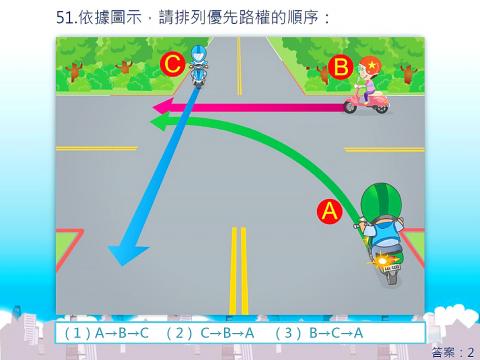Of the 250,000 people that take the scooter driver’s license test each year, more than half incorrectly answer questions about how to drive safely when a vehicle is positioned to the front and right of them, the Directorate-General of Highways (DGH) said yesterday.
Since 2015, when more than 1,000 questions were added to the exam database, the passing rate has dropped to less than 81 percent, the agency said.
After simulated scenarios were added on May 1, 2016, the rate dropped even lower, with only 68.91 percent of test takers passing, a record low for the nation, it said.

Photo courtesy of the Taoyuan Motor Vehicles Office
Examinees performed better on the questions added last year, with a more than 70 percent pass rate from December last year to April, it said, adding that the pass rate had fallen to 68.9 percent in November last year.
Although scenarios on paper allow test takers to understand the road situations that they might face, all examinees from September would need to do practice tests that would show their ability to perceive motorcycle hazards, the agency said.
The motorcycle hazard test platform requires examinees to watch videos and respond to events they consider dangerous, it said.
The top incorrectly answered questions from November last year to the end of last month included the distance that a rider should maintain from the inner tire of a large vehicle making a turn, which of three scooters coming from opposite directions has the right of way at a two-way intersection without signals or lights, the safest braking method for descending a hill and who has the right of way when a rider and an oncoming vehicle are turning into the same lane, the agency said.
With more than 13.8 million scooters nationwide, Taiwan has the highest scooter density in Asia, but, according to the National Police Administration, the top three infractions by scooter drivers are not yielding to traffic, inappropriate turns, and running traffic lights or not observing turn signals.
The agency said that last year it introduced more than 60 questions to simulate conditions related to right of way, turning, dangerous driving, inappropriate behavior, switching lanes and defensive driving.
It said it hoped that the questions would ensure that future drivers have the necessary attitudes and habits to perceive hazards and avoid accidents.

The inspection equipment and data transmission system for new robotic dogs that Taipei is planning to use for sidewalk patrols were developed by a Taiwanese company, the city’s New Construction Office said today, dismissing concerns that the China-made robots could pose a security risk. The city is bringing in smart robotic dogs to help with sidewalk inspections, Taipei Deputy Mayor Lee Ssu-chuan (李四川) said on Facebook. Equipped with a panoramic surveillance system, the robots would be able to automatically flag problems and easily navigate narrow sidewalks, making inspections faster and more accurate, Lee said. By collecting more accurate data, they would help Taipei

STATS: Taiwan’s average life expectancy of 80.77 years was lower than that of Japan, Singapore and South Korea, but higher than in China, Malaysia and Indonesia Taiwan’s average life expectancy last year increased to 80.77 years, but was still not back to its pre-COVID-19 pandemic peak of 81.32 years in 2020, the Ministry of the Interior said yesterday. The average life expectancy last year increased the 0.54 years from 2023, the ministry said in a statement. For men and women, the average life expectancy last year was 77.42 years and 84.30 years respectively, up 0.48 years and 0.56 years from the previous year. Taiwan’s average life expectancy peaked at 81.32 years in 2020, as the nation was relatively unaffected by the pandemic that year. The metric

TAKING STOCK: The USMC is rebuilding a once-abandoned airfield in Palau to support large-scale ground operations as China’s missile range grows, Naval News reported The US Marine Corps (USMC) is considering new sites for stockpiling equipment in the West Pacific to harden military supply chains and enhance mobility across the Indo-Pacific region, US-based Naval News reported on Saturday. The proposed sites in Palau — one of Taiwan’s diplomatic allies — and Australia would enable a “rapid standup of stored equipment within a year” of the program’s approval, the report said, citing documents published by the USMC last month. In Palau, the service is rebuilding a formerly abandoned World War II-era airfield and establishing ancillary structures to support large-scale ground operations “as China’s missile range and magazine

A 72-year-old man in Kaohsiung was sentenced to 40 days in jail after he was found having sex with a 67-year-old woman under a slide in a public park on Sunday afternoon. At 3pm on Sunday, a mother surnamed Liang (梁) was with her child at a neighborhood park when they found the man, surnamed Tsai (蔡), and woman, surnamed Huang (黃), underneath the slide. Liang took her child away from the scene, took photographs of the two and called the police, who arrived and arrested the couple. During questioning, Tsai told police that he had met Huang that day and offered to